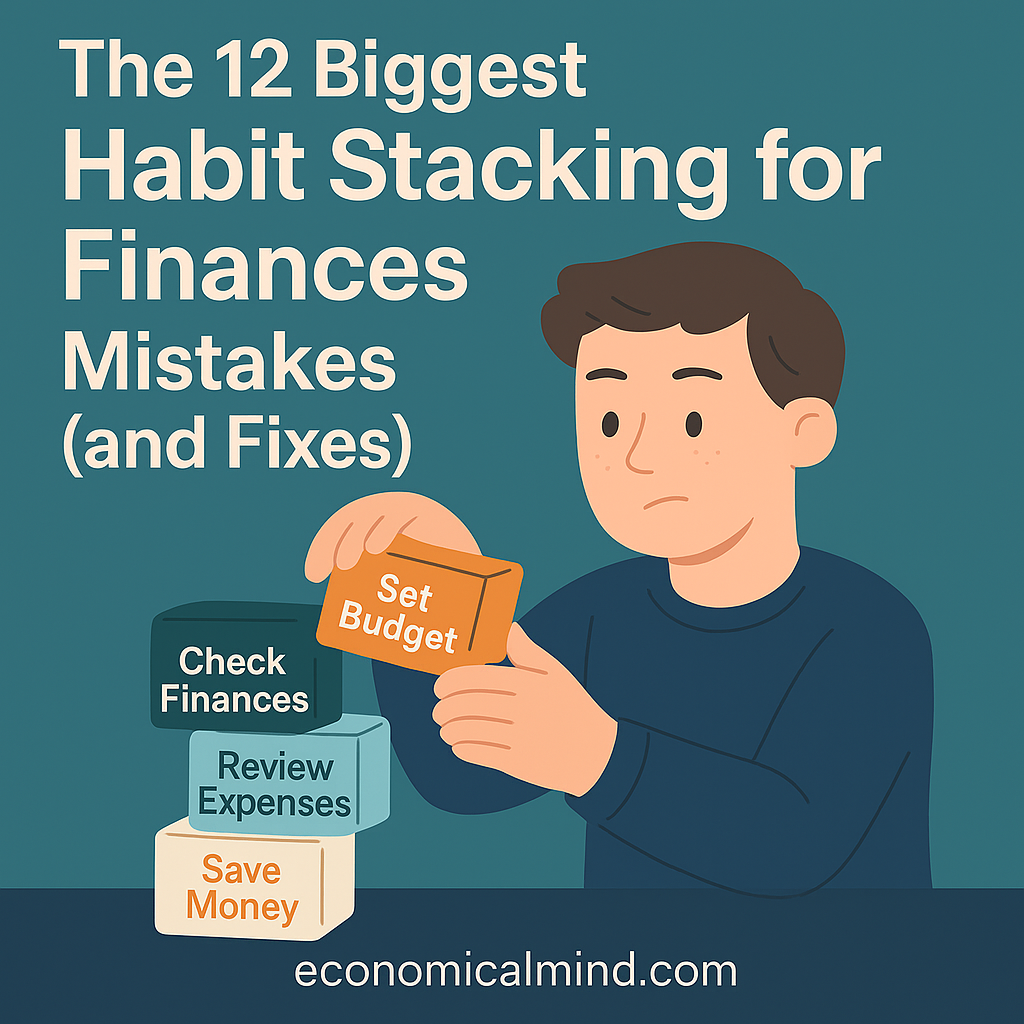
Building better money habits isn’t about making huge changes overnight — it’s about creating small, consistent actions that build momentum. That’s where habit stacking comes in.
Habit stacking means linking a new behavior to one you already do every day — like checking your budget after brushing your teeth or reviewing transactions while you drink your morning coffee.
It’s simple, powerful, and effective — but easy to mess up. Here are the 12 biggest habit stacking mistakes people make when trying to improve their finances, and the easy fixes for each.
1. Trying to Stack Too Many Habits at Once
Mistake: Overloading yourself with multiple new habits.
Fix: Start with one small financial action — like checking your account balance or tracking one daily expense — and build from there. Consistency matters more than intensity.
2. Not Linking It to an Existing Routine
Mistake: Creating habits without clear anchors.
Fix: Pair each new money habit with something you already do automatically — like paying a bill right after breakfast or saving spare change when you buy coffee.
3. Choosing Habits That Are Too Ambitious
Mistake: Setting goals that require too much time or effort.
Fix: Keep your new habits small and achievable. Instead of “reviewing all my finances daily,” start with “checking one account balance every morning.”
4. Ignoring Emotional Triggers
Mistake: Forgetting that habits are tied to emotions, not just logic.
Fix: Notice what motivates you — pride, security, peace of mind — and connect that feeling to your habit. Reward yourself for consistency, not perfection.
5. Not Writing the Stack Down
Mistake: Relying on memory alone.
Fix: Write out your new habit stack in this format:
“After I [current habit], I will [new habit].”
Example: “After I pour my morning coffee, I’ll transfer $5 to savings.”
6. Expecting Instant Results
Mistake: Getting frustrated when results don’t appear immediately.
Fix: Give yourself time. Small daily habits compound — just like investments. Focus on building the system, and the rewards will follow.
7. Not Tracking Progress
Mistake: Forgetting to measure success.
Fix: Keep a simple habit tracker — a notebook, calendar, or app — to mark each day you complete your financial action. Seeing progress keeps motivation strong.
8. Ignoring Automation
Mistake: Trying to manage everything manually.
Fix: Use automation to strengthen habits. Set up automatic transfers, bill payments, and savings goals so your “stacked habits” happen with minimal effort.
9. Making It Boring or Unrewarding
Mistake: Treating habits like chores.
Fix: Make it satisfying — listen to music while budgeting, visualize your goals, or celebrate small wins weekly. The more enjoyable the habit, the longer it lasts.
10. Forgetting to Adjust for Life Changes
Mistake: Sticking to the same stack even when your routine changes.
Fix: Revisit your habit stack every few months. If your schedule shifts, create new anchors so your habits remain consistent and realistic.
11. Not Aligning Habits with Financial Goals
Mistake: Building random habits that don’t move the needle.
Fix: Tie each habit to a clear goal — like saving for an emergency fund, paying off debt, or increasing investments. Purpose gives habits meaning.
12. Giving Up After Missing a Few Days
Mistake: Believing one slip-up ruins your progress.
Fix: Habits are about patterns, not perfection. If you miss a day, simply start again tomorrow. The real power of habit stacking is resilience, not rigidity.
Final Thoughts
Habit stacking transforms your financial life by making good choices automatic.
Whether it’s checking your budget before watching TV or setting savings transfers after payday, small, repeated actions build unstoppable momentum.
Over time, those tiny shifts compound into major progress — and financial confidence becomes your new default.
